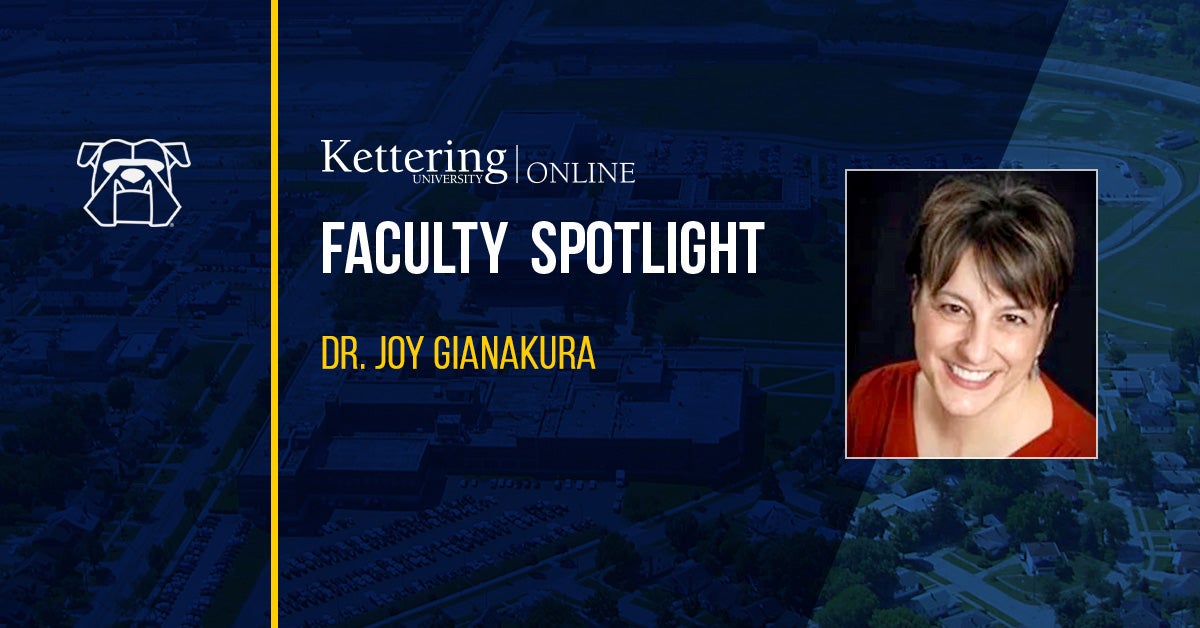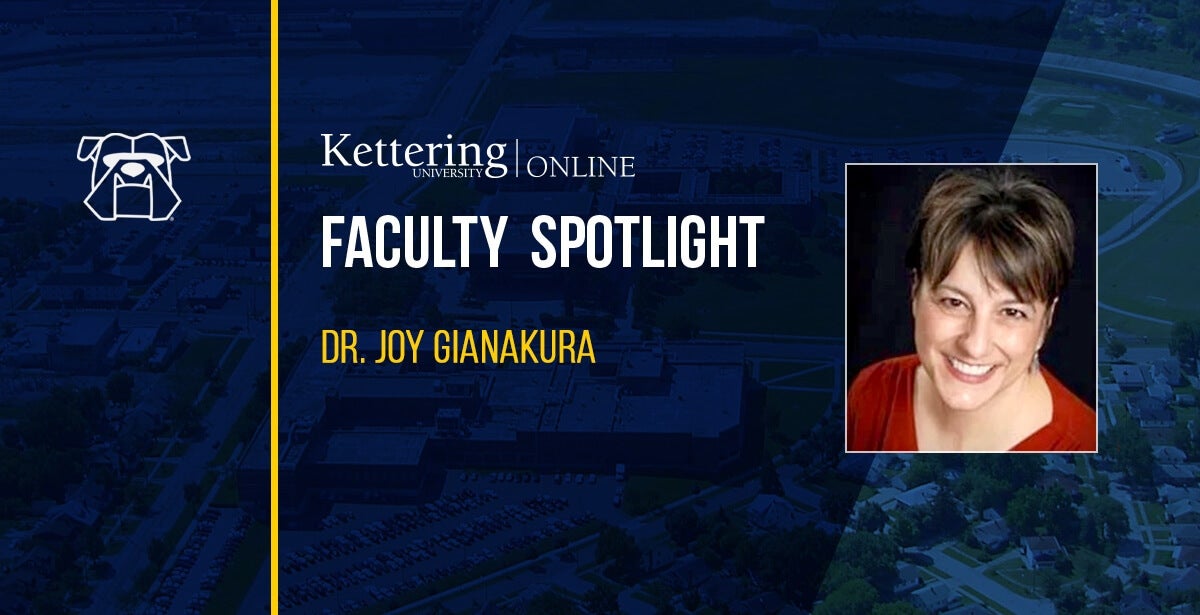
Faculty Spotlight: Dr. Joy Gianakura
As Kettering University Online’s (KUO) Program Development Manager, I have the pleasure of working with Contributing Faculty members. Coming from a wide range of educational, career, and geographical backgrounds, KUO faculty unite in the effort to link transformative experiential education to rigorous academic standards, with real-world applications for learning that lasts a lifetime.
This time, we are happy to shine the Faculty Spotlight on Dr. Joy Gianakura. Dr. Gianakura currently teaches a course in Leadership.
Following are excerpts from our conversation:
JL: Thank you so much for making time for this interview! Let’s start with which degrees you hold and from which institutions.
JG: Of course! I earned a BS in Education from Central Michigan University, a M.Ed. in Higher Education Leadership and Adult Learning from Grand Valley State University, and then I returned to CMU for my Doctor of Education degree in Administration and Leadership.
JL: In brief, can you talk a little bit about your teaching philosophy?
JG: Sure. I believe my role as an educator is to help students realize their own unique qualities and strengths as learners. I always make an effort to tell students when they have made strong connections between the learning material and the real world, or if they missed some of the nuanced concepts. Reinforcing “aha” moments is critical to keeping students engaged in learning for the sake of learning.
JL: You teach the Leadership for KUO, what do you think are some keys necessary for turning managers into leaders?
JG: Well, managers need to, first and foremost, understand themselves. They need to know who they are, what they are good at, and what they may lack in terms of strengths.
Secondly, managers ARE leaders. Everyone is a leader in some sense. We are also all followers! Even a president has a board or an entity they are accountable to. Managing people is a lot harder than managing “things,” or tasks. People need direction, a listening ear, and to be motivated to do their best work. The second key is understanding those who report to them. Understand where they are and what they need so that you can help them become their best selves.
Managers also need humility. Humility does not mean we martyr ourselves in some way, or act as though others know more. Humility is knowing what you know, being aware of what you do not know, and then pulling those who do know! Doing this builds trust in an organization.
JL: There are many styles of leadership and many leadership theories - which theory speaks most to you and your work?
JG: I believe I am a transformational leader. This style resonates with me because I am always trying to find ways to help my staff grow and become better versions of themselves. This requires me to listen and to work to remove barriers to their success.
JL: Describe two characteristics of poor leaders and how they impact their followers.
JG: People in leadership roles who would fall in the “poor leadership” category are those positioning themselves for the next promotion and not thinking of what the current work situation is, and how to make sure they are successful in their current role. I believe we should leave a place better than we found it. Those who are poor leaders tend to leave chaos in their wake. Avoiding conflict is also a strategy for failure or at least major setbacks. Many people will not face an issue head-on, but rather skirt the issue or ignore it until it either goes away or blossoms into a crisis.
JL: Describe two characteristics of effective leaders and how they impact their followers.
JG: Effective leaders know their individual staff members. They take a keen interest in what drives their people and work to foster that culture.
In addition, I think good leaders know when to celebrate success. Too often, we finish something and move right on to the next thing without pausing to pat ourselves on the back and celebrate the team that completed something great. Celebrations also help us to foster a positive work culture, which helps with retaining employees.
JL: What does it mean to be a good follower and how important is that ability?
JG: I have always maintained that no matter where I am in the hierarchy, my job is to make my supervisor look good. I expect my supervisor to have my back, but I, in turn, need to make sure I am running interference for things that do not need to end up on their desk. I also need to make sure I am keeping the mission and vision of the organization in mind so that I am working toward a common goal. In sum, good followers are loyal to the organization and its mission and knowledgeable about where the organization is heading. All leaders are following someone!
JL: How would you describe your Kettering students?
JG: My students are extremely motivated. I really enjoy their insights, as their experiences are very different from my own. Most of them have technical backgrounds and I do not, so even though I am teaching them, I tend to learn a lot from them as well. They are also hard-working! I find that KUO students are focused on doing their best work and understand that what they put into class is what they will get out of it.
JL: How do effective leaders manage and mitigate conflict?
JG: Effective leaders understand conflict happens. They also know that the sooner they respond to it or face it head-on, the better! Conflict avoidance is very prevalent in our lives. Whether it is work or personal, poor communication usually stems from people not addressing things in a timely manner. You can mitigate some conflict by being clear with your own communication, but I would encourage everyone to deal with it head-on without blame.
JL: What do you think are some of the skills and characteristics employers are most wanting from their employees, and how do you think Kettering University Online's programs fill those needs?
JG: I hear quite often from employers that they trust higher education institutions with preparing students for the technical functions of a job. What they really want us to do a better job of in education is helping develop stronger soft skills, or what I like to call human skills, in our graduates. KUO provides students a learning platform where they can practice soft skills in varying ways.
JL: Thanks again for taking the time to chat!
JG: Sure. Thank you!
KUO honors and appreciates Dr. Gianakura for her contributions and highly regarded work with students.
If you are interested in becoming a student, visit Kettering University Online and connect with an Admissions Advisor for information about our graduate degree programs. Our programs are 100% online, ideal for busy working professionals!
If you are interested in corporate, professional and/or continuing education opportunities through Kettering Global X, please consult our catalog.

